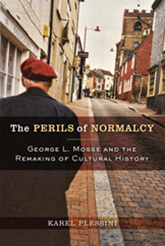The University of Wisconsin Press
Biography / History / Gay & Lesbian Studies / Judaica
The Perils of Normalcy A taboo-breaker and a great provocateur, George L. Mosse (1918–99) was one of the great historians of the twentieth century, forging a new historiography of culture that included brilliant insights about the roles of nationalism, fascism, racism, and sexuality. Jewish, gay, and a member of a culturally elite family in Germany, Mosse came of age as the Nazis came to power, before escaping as a teenager to England and America. Mosse was innovative and interdisciplinary as a scholar, and he shattered in his groundbreaking books prevalent assumptions about the nature of National Socialism and the Holocaust. He audaciously drew a link from bourgeois respectability and the ideology of the Enlightenment—the very core of modern Western civilization—to the extermination of the European Jews. Karel Plessini has been a fellow of the Institut für Europäische Geschichte in Mainz, Germany, and a George L. Mosse Visiting Scholar at the University of Wisconsin–Madison. Praise “Mosse continuously reflected on the difficulties of acting ethically in a world of power politics. . . . Plessini compellingly shows how the dialectics of ethics and realism played out in Mosse’s writings in multiple variations over the decades.” “Fortified by a treasure-trove of private papers and by reminiscences and critiques of scholars on both sides of the Atlantic, Karel Plessini has written a masterful account of how a gay Jewish refugee from Nazi Germany used his own lived experience to become a preeminent historian of his century’s traumas and transformations. George Mosse was a pioneer in historiography’s cultural turn, producing a cascade of books and new perspectives on nationalism, fascism, racism, religion, sexuality, war and Judaism. Plessini traces both the genesis of Mosse’s individual works and judiciously assesses their impact on historiography with clarity and precision.” Media & bookseller inquiries regarding review copies, events, and interviews can be directed to the publicity department at publicity@uwpress.wisc.edu or (608) 263-0734. (If you want to examine a book for possible course use, please see our Course Books page. If you want to examine a book for possible rights licensing, please see Rights & Permissions.)
|
|
||||||||
|
|
If you have trouble accessing
any page in this web site, contact our Web manager. Updated 03/11/2015 © 2013 The Board of Regents of the University of Wisconsin System |

